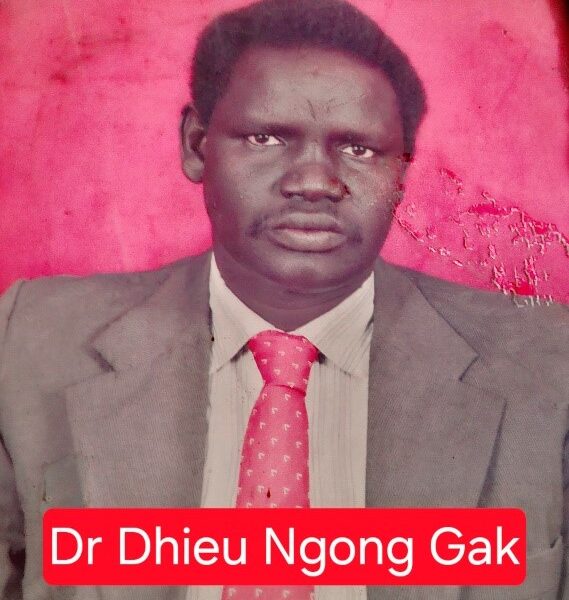By Dr. Dhieu Ngong Gak
South Sudan occupies a total area of 644,329 square miles with a population estimated to be more than 11,880,796, or 8,000,000 people, after independence.
This area is inhabited by 64 ethnic groups, according to available resources, or 70s, according to other information, who speak 64 to 70 languages and dialects. The country has great diversity in terms of cultures, religion, and environmental degradation and has been in conflict since its beginning. Their origins are from Africa, only that every ethnicity is proud of itself and its cultural value system. They see themselves and their cultures as the ideal model of God’s creation, even though they are not unique in their self-esteem. Every social and cultural group idealizes itself as a model of human dignity, especially when a group comes in contact with another group or groups, where issues of diversity arise and subjective senses of superiority occur and raise challenges of intergroup interaction.
Ethnicities of South Sudan are typically African, and there will be no one-day, one-time ethnic cleansing policies that will take place. There is no one ethnicity that is the true African, and others are not. However, some sort of diffusion and escalation will not be avoided since some parts of these ethnicities are divided between South Sudan and the neighboring states: Nuer, Anuak, and Murle are divided between South Sudan and Ethiopia; Acholi, Madi, Kuku, and Kakuwa are divided between South Sudan and Uganda; Azandi is divided between the Democratic Republic of Congo (DRC) and South Sudan; and some tribes from Bahr el Ghazal are divided between South Sudan and the Central African Republic (CAR). This situation can contribute to the diffusion and escalation of ethnic conflict in any state and society. Ethnic alliance ignites conflict in other states or spillover processes by which conflict in one country directly affects neighboring countries or states, especially if they are an abused majority. They can spoil the domestic balance of power and turn the kin into internal ethnic conflicts. One example was when the president Idi Amin of Uganda fell in 1979, and the majority of Kakuwa, who were around Idi Amin in Uganda as Ugandan citizens, ran away from Uganda to South Sudan and upset the balance of power by using a chain reaction of power distribution and became the new majority after they matched with their brothers Kakuwas of South Sudan. They joined the ongoing internal ethnic conflict in South Sudan and controlled the central authority by taking windows of vulnerability and by considering the state with significance to be an easy target with the support of internal kinship, where they collaborate with external kinship to collapse the state or drain its economy and weaken it from within. South Sudan is not exceptional compared to other states and societies of the world. It is within the nexus of comparative and international understanding of conflict. If we focus on the link between ethnic and interstate conflict, especially on the internationalisation of ethnic and interstate conflict, the recognition will be on the internationalisation of ethnic conflict as requiring an understanding of intrinsic structures and processes. Ethnic alliances draw neighboring kinship into the internal ethnic conflict. The Kakuw, who interred South Sudan in 1979, changed the political balance in South Sudan by using intrigues and managed to bring the government of Joseph James Tumbora to the top.
Today, South Sudan, as a state pursuing national interests and international relations, has a domestic political environment that characterizes most divided States is still unclear. Theorists assume that the central government commands the obedience of different groups under its authority and thereby controls what goes on within its borders. That assumption is not yet fulfilled in South Sudan. The South Sudan government is unable to control different groups under its umbrella. Internal armed conflicts are devastating the country; the workforce is not receiving their salaries regularly. All these problems and others have strong ethnic dimensions. People are afraid to use the terminology “state failure,” which means the collapse of the central state apparatus and its ability to control national territory as a result of spiralling internal ethnic conflicts. If you compare the approaches of the theorists to decide the causes of the South Sudan problems, no one particular approach will match with these approaches. Theorists focus on the role of international structures and politics to explain domestic conflicts, as Theda Skocpol (1979) stated. Others viewed conflict as the result of purely internal disputes and histories only indirectly influenced by external dynamics, yet international conditions can provide favorable and unfavorable opportunities for access to resources, legitimacy, and coalition partners. Most theoretical approaches that focus on the impact of international politics on domestic conflicts remain limited largely to the economic policy-making process. Dependency School theorists drew attention to systematic ways in which important influence is is exercised by multinational corporations, foreign governments, and international financial organizations in the internal policy-making processes and political coalitions of underdeveloped countries. Even in the area of political economy, many institution-oriented analyses continue to focus on domestic economic structures in determining policy outcomes and coalitions. On the other hand, realist theorists’ accounts accentuate systematic pressure as determining but ignore the influence of domestic politics. Comparative analyses emphasize internal factors to grant domestic coalitions primacy but neglect the importance of international politics. After all, they agreed that intermestic forces and the entangling of domestic and international pressures and their internal and external reverberations contribute to the diffusion and escalation of ethnic conflict.
People believe that there are significant differences within states with multiple actors that influence a state’s international policies and its position in the global system. International actors play a major role in the possibility of constructing domestic political coalitions, either by supporting or opposing them. This is true because some politicians defected from South Sudan and made their base for fighting the government from the neighboring countries, supported by international actors.
Dr. Dhieu Ngong Gak. Peace and Development Studies. University of Juba




